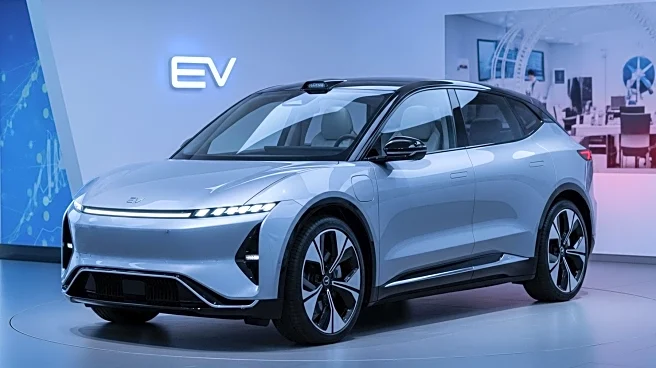What's Happening?
Slate Auto, a new electric vehicle startup backed by Jeff Bezos-linked venture capital, has unveiled its first EV, the Blank Slate pickup truck, at its newly refurbished factory in Warsaw, Indiana. Despite the expiration of the $7,500 federal tax credit on September 30, the company is moving forward with production. The factory, previously a printing plant, is expected to create over 2,000 jobs, replacing the 525 jobs lost when the plant closed in 2023. The Blank Slate pickup is designed to be affordable, priced under $20,000, and features a stripped-down design requiring only 600 parts. Local officials, including U.S. Representative Rudy Yakym, have expressed support for the factory, highlighting its contribution to local job creation and investment.
Why It's Important?
The launch of Slate Auto's new EV is significant as it represents a shift towards more affordable electric vehicles, potentially broadening the market for EVs in the U.S. The expiration of the federal tax credit could impact consumer decisions, but Slate Auto's low-cost model aims to mitigate this. The creation of over 2,000 jobs in Indiana is a substantial economic boost for the region, demonstrating the potential for EV manufacturing to revitalize local economies. The involvement of high-profile investors like Jeff Bezos underscores the growing interest and investment in sustainable transportation solutions.
What's Next?
Slate Auto plans to continue developing its EV lineup, leveraging its streamlined production model to maintain affordability. The company will likely focus on expanding its market presence and addressing consumer needs for budget-friendly, zero-emission vehicles. As the factory ramps up production, local economic benefits are expected to increase, potentially influencing other regions to support similar initiatives. The broader EV industry may watch closely to see how Slate Auto navigates the challenges posed by the expiration of tax credits and ongoing tariff issues.
Beyond the Headlines
Slate Auto's approach to EV manufacturing, focusing on simplicity and cost-effectiveness, could influence industry trends towards more accessible electric vehicles. This strategy may appeal to consumers who prioritize affordability over advanced features, potentially shifting market dynamics. The company's success could encourage other startups to adopt similar models, fostering innovation and competition in the EV sector. Additionally, the political implications of tax credit policies and their impact on the EV market may continue to be a point of discussion among lawmakers and industry stakeholders.











